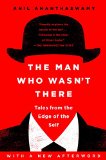Summary | Excerpt | Reviews | Beyond the Book | Readalikes | Genres & Themes | Author Bio
Investigations into the Strange New Science of the Self

Critics' Opinion:
Readers' Opinion:
First Published:
Aug 2015, 320 pages
Paperback:
Aug 2016, 320 pages
 Book Reviewed by:
Book Reviewed by:
James Broderick
Buy This Book
About a month before May came to Cohen's clinic, she had started feeling extremely sad and depressed, and eventually began exhibiting delusions about her own existence. By the time she was admitted, she had become severely catatonic—mute and unmoving. "Even the nurses were terrified by her," Cohen told me. But with a few days of inpatient psychiatric care, May recovered somewhat, just enough to say a few words each day, which the nurses would write down diligently. Between these sporadic intimations from May and discussions with her parents, Cohen pieced together May's story.
Her family was middle-class Catholic. May had two siblings, a brother and a sister. The sister, who was ten years older, had married a dentist. The family had a history of depression: their mother had suffered from severe depression before May was born, and one of May's aunts had undergone electroconvulsive therapy (ECT), which involves delivering mild pulses of electricity to the brain to induce seizures, and is often an effective treatment for severe depression—though almost always of last resort.
May's delusions were classic Cotard's. "She was telling us that she had no teeth, no uterus, and that she had this feeling of being already dead," Cohen said. He struggled to describe May's condition in English. "I don't know the word in English . . . morts vivants!" he said. I looked it up later: the literal translation is the living dead.
"She was waiting to be buried . . . in a coffin," said Cohen.
When her condition didn't improve even after six weeks of therapy and medication, Cohen suggested ECT. Given the family's experience with depression, her parents immediately agreed. After six treatments, May appeared to recover, so Cohen stopped the ECT—but she relapsed immediately, prompting Cohen to resume the treatment. This time she did recover, except for some headache, mild confusion, and slightly disturbed memory. When she began talking, it was as if she had awakened from a nightmare.
Cohen's discussions with her—in which he asked May to talk freely of any associations that came to mind when he mentioned her delusions—shed surprising light. For instance, the delusion that she had no teeth seemed to have something to do with her sister's husband, the dentist. Cohen discerned that she may have had feelings for her brother-in-law. She spoke of never wanting to be treated by him. Again, Cohen struggled for the correct word in English to describe the way she expressed herself. Pudique, he said in French. "Modest." She spoke of her brother-in-law in "such a way that you understood that she'll never be naked in front of him."
Her delusions about missing her uterus seemed to be tied to episodes of masturbation. "She felt very guilty about that and she thought that maybe she would be sterile."
Cohen was making the point that the specificity of the delusions is related to one's autobiography and the cultural context. To make his case for the latter, he recalled a fifty-five-year-old man who had come to see him in the 1990s. Cohen diagnosed him with Cotard's. One of his delusions was that he had AIDS—which he didn't. Cohen figured his delusion was linked to guilt over his hypersexuality during the manic phase of his bipolar disorder, from which he also suffered. Before the 1970s, hypochondriac delusions in Cotard's patients, if they involved sexually transmitted diseases, were almost always related to syphilis—the cultural scourge of the times. Interestingly, this man had actually contracted syphilis while serving in the military as a young man (Cohen tested him for antibodies to confirm). But his delusions during his Cotard's episode, which happened decades later, were not about syphilis but HIV/AIDS—which had supplanted syphilis in the broader culture as "God's punishment for sins of the flesh" (syphilis almost never shows up anymore during hypochondriac delusions in Cotard's). "It's only one case, [but] I think this case is very informative," Cohen said.
Excerpted from The Man Who Wasn't There by Anil Ananthaswamy. Copyright © 2015 by Anil Ananthaswamy. Excerpted by permission of Dutton. All rights reserved. No part of this excerpt may be reproduced or reprinted without permission in writing from the publisher.




Wherever they burn books, in the end will also burn human beings.
Click Here to find out who said this, as well as discovering other famous literary quotes!
Your guide toexceptional books
BookBrowse seeks out and recommends the best in contemporary fiction and nonfiction—books that not only engage and entertain but also deepen our understanding of ourselves and the world around us.